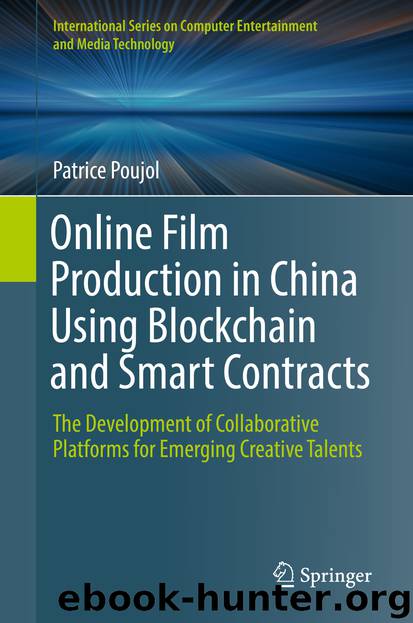Online Film Production in China Using Blockchain and Smart Contracts by Patrice Poujol

Author:Patrice Poujol
Language: eng
Format: epub
ISBN: 9783030024680
Publisher: Springer International Publishing
The Aquascutum high-end UK clothing brand collection was worn by most of the lead cast in the film and at surrounding promotion events. For Alibaba, the operator in chief of the film and also the giant online retailer, this was a good opportunity to connect with new potential clients both in terms of client brands and new customers. Despite these commercial opportunities, a small degree of power was given to collective negotiation. This manifested when whisky brand Johnnie Walker Black Label were proposing c. RMB5 million for Eric Liddell to drink a friendship toast with supporting character Xu Niu. Eric Liddell’s daughters and Mr. Fiennes himself opposed this decision since Eric Liddell in real life had made a point to never drink alcohol. The production reluctantly let the whisky brand go for fear of legal issues and to ensure Mr. Fiennes’ enthusiastic participation.
At the exception of the Whiskey sponsor, corporate sponsors who had higher profiles and higher commercial and financial stake in the film had generally the most influence on the shoot and the creative output. As French directors Yves Boisset and Jean-Pierre Mocky have claimed, one of the most difficult censorship to deal with is financial censorship (Boisset 2011; Mocky 2014). It is an insidious form of censorship. George Ramsay adds that ‘the clever thing about capitalism is that it becomes its own opposition’ and therefore even political art ends up being financed or not by large corporations (Ramsay 2014). It is a more advanced and subtler form of censorship that comes with the economic structure of capitalism. This is a structure that China has inherited since the transition after 2001.49 As a result, Chinese censorship is now political, economic as well as cultural.
Surprisingly, Alibaba representatives generally appeared to be a much tighter censor than the government state agencies. The company ordered a blackout of on-set pictures and footage for lead actors until several weeks after the shoot (28 September 2016). This deterred most of the foreign press, as they could not understand why Alibaba had acted as a monopoly and exclusive commercial conduit for celebrity pictures and articles between the production and the audience. Alibaba was motivated by a dual business and political agenda. On the one hand, it was acting in its best economic interest, and on the other hand it was supporting the government’s guidelines. As the distributor and one of the financiers of the project, it had tremendous power over the film and went up to the extent of imposing creative ideas on the production team. The team later claimed that these ideas damaged the credibility and the quality of the film, it also cost money to the production as the movie had to be re-cut several times to satisfy Alibaba’s Executives.
In the words of Mr. Jonny Koo (Mr. Shin’s Associate at Innowave), Alibaba’s representatives were ‘young guys in their late twenties who had never made a film in their life and thought they knew the market better than anyone because they had audiences’ statistics on hand based on their retail customers.
Download
This site does not store any files on its server. We only index and link to content provided by other sites. Please contact the content providers to delete copyright contents if any and email us, we'll remove relevant links or contents immediately.
Call Me by Your Name by André Aciman(20499)
Ready Player One by Cline Ernest(14644)
How to Be a Bawse: A Guide to Conquering Life by Lilly Singh(7472)
Wiseguy by Nicholas Pileggi(5770)
The Kite Runner by Khaled Hosseini(5170)
On Writing A Memoir of the Craft by Stephen King(4935)
Audition by Ryu Murakami(4923)
The Crown by Robert Lacey(4807)
Call me by your name by Andre Aciman(4676)
Gerald's Game by Stephen King(4641)
Harry Potter and the Cursed Child: The Journey by Harry Potter Theatrical Productions(4494)
Dialogue by Robert McKee(4389)
The Perils of Being Moderately Famous by Soha Ali Khan(4216)
Dynamic Alignment Through Imagery by Eric Franklin(4208)
Apollo 8 by Jeffrey Kluger(3702)
The Inner Game of Tennis by W. Timothy Gallwey(3679)
Seriously... I'm Kidding by Ellen DeGeneres(3628)
How to be Champion: My Autobiography by Sarah Millican(3590)
Darker by E L James(3512)
